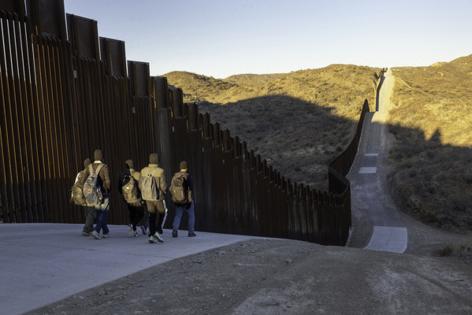Judge orders halt to Trump push to shut down border crossings
Published in News & Features
WASHINGTON — A federal judge on Wednesday ordered the Trump administration to halt implementation of a presidential proclamation that cracked down on border crossings and asylum claims, finding that the policies violate federal law.
Judge Randolph D. Moss of the U.S. District Court for the District of Columbia issued the ruling in a challenge from immigration groups and a class of immigrants denied entry to the U.S., and finds that President Donald Trump does not have the authority to suspend asylum claims or entry outside of official ports of entry into the United States.
Congress has already laid out federal rules for immigration procedures in the Immigration and Nationality Act, both for asylum-seekers and deportations, and Trump does not have the authority to deviate from them by claiming an “invasion” of the U.S.-Mexico border, Moss wrote.
“Here, nothing in the INA or the Constitution grants the President or his delegees the sweeping authority asserted in the Proclamation and implementing guidance. An appeal to necessity cannot fill that void,” the judge wrote.
The Trump administration almost certainly will appeal the ruling, with the White House on Wednesday touting that the president’s policies have led to lower border crossings, on track this fiscal year “to see the fewest illegal immigrant encounters in five decades.”
Moss said that he would not grant a pause on his ruling while the case goes through the courts but did give the Trump administration a 14-day window to appeal and seek one from the U.S. Court of Appeals for the District of Columbia Circuit.
The ruling is one of the highest profile to go against the Trump administration since a Supreme Court ruling Friday, in a challenge to a birthright citizenship push, that curtailed the ability of courts to issue nationwide preliminary injunctions.
Wednesday’s decision differs in several areas, including that Moss certified a class on behalf of immigrants who were denied their rights under federal law and that Moss made a final ruling on the legality of Trump’s effort, rather than a preliminary one.
One of a flurry of day one executive actions from the Trump administration, the proclamation at the base of the dispute declared an “invasion” of immigrants into the country and that changes were needed to protect against the incursion, including suspending crossings between ports of entry and asylum claims.
The Department of Homeland Security issued guidance stating that entry into the United States by undocumented immigrants would be suspended until Trump found that the “invasion” had ended. The guidance sought to prohibit entries outside of official ports of entry and invocations of legal protections that include asylum claims.
After the order and guidance were issued, a group of anonymous plaintiffs and immigration organizations sued, arguing the order and subsequent guidance violated federal immigration and administrative law.
Moss wrote that Trump’s actions were not supported by the INA and that his invocation of the Constitution’s clause for protection against invasion did not give him the authority to do so.
Nowhere has the Supreme Court “ever suggested that the President’s inherent authority to protect the borders of the United States permits him to supplant rules proscribed by Congress,” Moss wrote.
“To hold otherwise would render much, if not most, of the INA simply optional,” Moss wrote.
The case is Refugee and Immigrant Center for Education and Legal Services et al., v. Kristi Noem, secretary of Homeland Security, et al.
©2025 CQ-Roll Call, Inc., All Rights Reserved. Visit cqrollcall.com. Distributed by Tribune Content Agency, LLC.







Comments